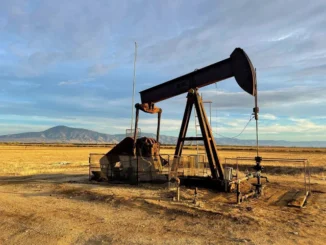
ENB Pub Note: This article is from Ronald Steinn, author and guest on the Energy News Beat podcast. He has some outstanding points, and again highlights “Turley’s Law,” as dubbed by David Allen, another guest on the podcast. Stu has been saying for years that the more money invested in wind, solar, and hydrogen, the more fossil fuels will be used. That has been holding solid, and until the technology changes, “Turley’s Law” will remain relevant.
A global challenge today is reconciling the conflict between policies that aim to ensure everyone has access to affordable, reliable electricity with those that protect the environment everywhere.
The sheer scale of humanity’s needs today adds urgency to the truism that “quantity has a quality all its own.” To feed, shelter, move, educate, and power civilization, humanity acquires and uses some 100 billion tons of Earth’s natural resources annually.
Today, oil, coal, and natural gas are the basis of over 80% of all global demand for the products and transportation fuels that did not exist before the 1800s.
Policymakers setting “green” and “zero emissions” policies are oblivious to the reality that electricity came about after the discovery of oil. Without oil, there would be no products like wire, insulation, and computers to generate electricity!
So-called “renewables, only generate electricity but cannot make anything. In addition, everything that needs Electricity is made with petrochemicals manufactured from crude oil, coal, or natural gas.
Despite a decline in extreme poverty, broader measures show that of the more than 8 billion living on this planet, Nearly half the world lives on less than $5.50 a Day, as billions still struggle to meet basic needs. To put the above into perspective for the wealthy locations pursuing a clean and green movement:
- California has about 0.4% of the world’s population, meaning that 99.6% of the 8 billion people on this planet live outside California.
- America has about 4% of the world’s population, meaning that 96% of the 8 billion people on this planet live outside the USA.
Thus, bogus myths by a few wealthy countries have been created to promote renewables that are supposedly green and kind to the environment, cheap, and will replace fossil fuels.
- All six methods for the generation of electricity from coal, natural gas, hydro, nuclear, wind, and solar are all built with the products, components, and equipment that are made from oil derivatives manufactured from crude oil.
- All EVs, solar panels, and wind turbines are also built with the products, components, and equipment that are made from the oil derivatives manufactured from crude oil. Without fossil fuels, there would be no so-called renewables!
- Everything that needs electricity to function, like iPhones, computers, data centers, and X-Ray machines, is made with petrochemicals manufactured from crude oil. Without fossil fuels, there would be nothing that needs electricity!
History and reality suggest a desire for economic growth everywhere, which invariably leads to the need for more, not less, products and electricity in a growing, materialistic society.
There is a very strong correlation, both historically and globally, between access to affordable, reliable electricity and the realization of safety, comfort, convenience, and beauty—what we call human flourishing. Yet, globally, there is an enormous spread between the per capita consumption in developed nations compared with poorer nations that are developing or still emerging.
Higher fossil fuel costs make products and services more expensive. Income determines a person or family’s ability to purchase goods and services, starting with the basics—food, clothing, and shelter—and progressing to plumbing, heating, and cooling. It also determines access to many things that citizens in wealthier nations take for granted, such as cars, education, sanitation, healthcare, and leisure.
There is a strong correlation between poverty and the “deprivation” of the full range of basic products and services taken for granted by wealthier citizens. A personal car is the iconic energy-dependent product that is highly correlated with freedom of mobility, as well as improved personal and national economic outcomes. In the United States, there are roughly 800 cars for every 1,000 people; in poorer nations, there are only a few cars for every 1,000 people.
Much of the rhetoric one hears from representatives of wealthy nations at global gatherings is focused on the goal of lowering global CO2 emissions. Such a singular focus not only ignores the realities of multidimensional environmental issues but also, more importantly, ignores energy poverty and the central need for access to a sufficient supply of affordable electricity. This is the only way to increase well-being everywhere and reduce destructive global disparity. For the foreseeable future, much of the energy to achieve this will come from oil, natural gas, and coal.
The high price of electricity from wind and solar deployed at society-scale illustrates an important cost of supply principle because everyone needs affordable and reliable energy, whether the products are made from oil, electricity, gasoline, diesel, aviation, or heating fuel—the higher the overall costs, the more damaging it is proportionally for those who can least afford it.
Improving the well-being of the billions living in poverty will vastly increase demand for, and thus the energy associated with, all conventional products and services — from home heating and cooling to transportation, healthcare, sanitation, and more. Then, in wealthy nations, there is a further effect on energy demand from the continued development of new products and services.
Making products and services more energy-efficient effectively makes them more affordable and accessible to more people, thereby increasing overall energy demand.
When wealthy economies export production of minerals and metals, they impose environmental impacts and the exploitation of human atrocities on less wealthy nations.
Economic, political, and science and technology guiding principles for the 21st Century:
(1) Economics
Lifting people out of poverty to alleviate suffering and promote human dignity requires more products to generate affordable and reliable electricity and fuels for transportation.
Human flourishing requires more electricity that is less expensive, continuous, and more reliable, not less electricity that is more expensive and less reliable.
In the pursuit of flourishing, humans continually invent new products and services made from the oil derivatives manufactured from oil, many of which necessarily use electricity.
(2) Politics
Electricity security is a top priority for global leaders, revealed in their actions, if not always their words.
When wealthy economies export electricity production, they impose environmental impacts and human atrocities on less wealthy nations.
Government mandates and/or excessive intrusion in markets stifles electricity generation innovation, options, and freedoms.
(3) Science and Technology
Capturing and delivering electricity to society is about inventing, building, and perfecting technologies based on what physics, natural resources, and engineering allow.
All society-scale electricity-generating systems have cost and environmental trade-offs.
The earth’s natural resources available to support electricity generation are fundamentally limited.
We must remember, for the present and future, that all 8 billion living on this planet represent a materialistic society, and that electricity cannot exist without the products made from fossil fuels, and that so-called “renewables” cannot make any products or fuels.
Please share this information with teachers, students, and friends to encourage Energy Literacy conversations at the family dinner table.
Originally published at America Out Loud News.
Click this link to sign up for Energy Literacy from Ronald Stein.
Got Questions on investing in oil and gas? Or do you have a Tax Burden in 2025?
ENB Top News
ENB
Energy Dashboard
ENB Podcast
ENB Substack







